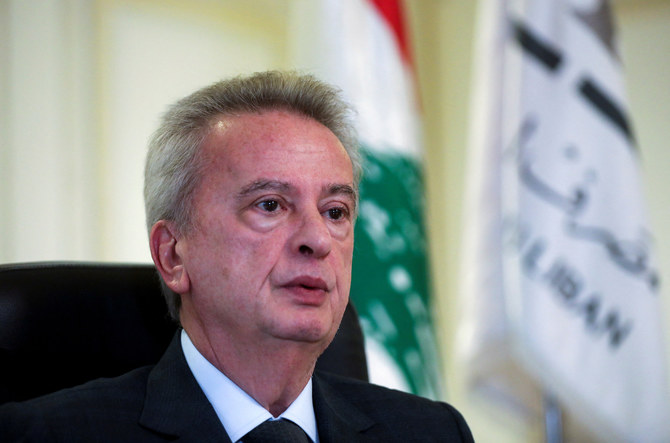BEIRUT: A Lebanese judge on Wednesday banned the country’s central bank chief Riad Salameh from traveling, days after Beirut received an Interpol red notice following a French arrest warrant.
Imad Qabalan, general prosecutor at the Lebanese Court of Cassation, questioned Salameh before releasing him pending investigation, and confiscating his Lebanese and French passports.
Salameh, 72, appeared before Qabalan, who informed him of the Interpol warrant issued against him by the French judiciary on May 16. He was then charged with the accusations listed in the red notice.
Lebanon’s long-serving central bank chief has been the target of a series of judicial investigations both at home and abroad over allegations including fraud, money laundering and illicit enrichment.
The latest step comes in the context of investigations being conducted by the European judiciary. Salameh, his brother Raja, and his assistant Marianne Hoayek are suspected of being involved in corruption in European banks.
Interpol circulated the red notice last week after a French magistrate issued a warrant for Salameh, who failed to appear for questioning in Paris before investigators probing his sizeable assets across Europe.
Aude Buresi, the French judge in charge of investigating Salameh’s funds and assets in Europe, issued an international arrest warrant against Salameh on May 16 after he failed to appear at his interrogation session in Paris.
The session was expected to charge Salameh with suspicion of accumulating a huge fortune in Europe, including money and real estate, through complex financial arrangements and embezzlement of large sums of public funds in Lebanon.
Qabalan’s hearing with Salameh was off camera and away from journalists at the Palace of Justice in Beirut. The floor where the meeting was held was cleared of media personnel and lawyers.
A judicial source who followed the details told Arab News that the session was limited to “notification, confiscation of passports, and leaving Salameh subject to investigation.”
“The Lebanese judiciary, through the International Communication Branch, notified the French judiciary of Lebanon’s execution of the red notice and asked the French side to fulfill a Lebanese request to recover Salameh’s file from the Paris court,” the source said.
Meanwhile, on Wednesday, the German consul in Lebanon told Judge Ghassan Oueidat, Lebanon’s prosecutor general, about the issuance of a German arrest warrant against Salameh.
The source said Lebanon is “not concerned with this notice, as it is an internal German judicial matter.”
Riad Salameh told Al-Hadath TV channel that he “has not been informed of any German arrest warrant against him.”
The European investigations, which involve France, Germany, and Luxembourg, focus on the relationship between the central bank of Lebanon and the company Forry Associates registered in the Virgin Islands, with an office in Beirut, owned by Raja Salameh.
There are suspicions that it was a shell company used to transfer money from Lebanon to European countries, amounting to more than $330 million, which is suspected to have been embezzled from the central bank through a grant contract for the mentioned company and obtaining illegal commissions from local Lebanese banks.
Riad Salameh’s term as the bank governor ends at the end of July, and the debate in political circles focuses on his successor, given the presidential vacancy, the caretaker government, and the repercussions of Salameh’s legal pursuit in Lebanon and abroad on Lebanon’s financial and economic reputation.
On Wednesday, the caretaker Prime Minister Najib Mikati emphasized that “the law provides for procedures to address the issue of the governor of the central bank of Lebanon.”
He responded to those who accused him of covering up for Salameh by demanding that they give “a legal opinion on taking appropriate measures against the governor contrary to what was agreed upon during Monday’s consultative ministerial meeting, which emphasized the need to prioritize the public interest over private interests.”
The ministers are divided between those who support Salameh’s dismissal and those who support the status quo until a judicial decision is issued.
The Lebanese government cannot dismiss the governor, and its only move is to call on Salameh to resign.
MP Qassem Hashem said: “The judicial process against Salameh is taking its course in accordance with legal principles.”
Hashem said he hoped “the presidential elections could be be completed before the end of July, the end of the governor’s term.”
He also believed that “if that is not possible, we will have two options: either the government, even if it is caretaker, makes a decision to appoint a new governor with political cover from all political forces, or according to the monetary and credit law, the deputy governor assumes the responsibilities of the governorship for a temporary period to maintain financial and monetary stability in the country.”



























